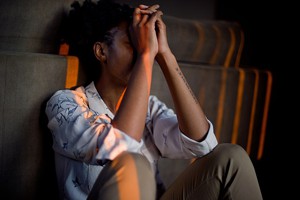Anxiety Improved By Acupuncture And Electroacupuncture - With or Without Pharmaceuticals

Globally, mental disorders, notably anxiety and depression, are a massive problem with hundreds of millions of people suffering, many with little or no access to treatment. The situation appears to be worsened by all of the experiences and changes related to the current pandemic (source). Even in developed countries, access to western health care options (therapy, medications) are limited for a number of reasons and that access is less and even non-existent in many parts of the developing world. Further, options such as properly applied acupuncture and/or Chinese herbal medicine, while arguably far more cost-effective, are also difficult to obtain in many areas of the world.
Generally speaking it is well agreed upon that anxiety disorders can be aided with acupuncture and/or Chinese herbal medicine - there are a large number of studies already published, many presented on our site, and countless positive clinical outcomes from patients around the world who have access to such care. There are, however, questions as to how to achieve the best results, in the quickest time frame and functional questions surrounding whether western approaches (medications, therapy, etc.) limit or aid the process of Chinese Medicine - whether it be acupuncture or herbal medicine or both.
Practitioners of Chinese Medicine generally understand well the diagnostic processes involved in approaching a patient’s health issues. Due to deeper theoretical understandings, more “standardized” protocols - such as those often in research studies - are often limited in value. However, many practitioners around the world are very “lightly” trained in proper Chinese Medicine theories and, consequently, can benefit from these approaches. Further even with proper differential diagnostic based approaches by experienced Chinese Medicine practitioners, knowing what can consistently work and within what general timeframe results can/should be experienced, can be important considerations in your treatment protocol design.
In the study we are exploring today, researchers from the Instituto de Ciências Biomédicas, among other institutes in Portugal, conducted a double-blinded randomized controlled clinical trial exploring the efficacy of acupuncture and electroacupuncture on anxiety. The double-blinding happened primarily by the acupuncturist not knowing whether or not the patient received acupuncture or electroacupuncture (a second researcher was responsible for turning the machine on - or not). The participants, ranging in age from 21-82 years old, had anxiety diagnoses and they were offered weekly acupuncture (30 minute sessions - 15 minutes acupuncture + 15 minutes procedural) for 10 weeks. The participants were further randomized with regards to whether or not they were taking anti-anxiety medications and/or antidepressants.
The acupuncture protocol was as follows:
Yintang - "Hall of Seal" - a common point for anxiety, insomnia, etc.
SP 6 (R) - "Three Yin Intersection" - influences the "yin" of the body (the calming/nourishing/cooling) aspects.
ST 36 (L) - "Leg Three Li (~mile)" - a strengthening and balancing point used for a wide range of influences including psychological/emotional issues.
LI 4 (R) - "Union Valley" - useful, particularly with LV 3 for stress related issues, but a wide range of influences.
LV 3 (R) - "Great Surge" - useful, particularly with LI 4 for stress related issues, a very wide range of influences.
PC 6 (bilateral) - "Inner Pass" - a commonly used point to calm the person, open the chest (palpitation, perceived or real tension in chest, etc.), nausea and other influences.
HT 7 (bilateral) - "Spirit Gate" - an important point for calming the nervous system, emotional issues, and a wide range of severities of anxiety, among other influcens.
CV 17 - "Chest Center" - a useful point for opening tension in the chest/upper body, descend energy in the body.
GV 20 - "Hundred Convergences" - a wide range of uses, used to descend energy in the body and calm the nervous system.
And auricular points (bilateral):
Shen Men - commonly used point for stress, anxiety, insomnia.
Antidepressant 1 - ranges of depression.
Heart - anxiety issues, physical heart issues.
Master Cerebral - range of anxiety disorders, OCD, etc.
For the patients who received electro-acupuncture electrodes were connected at the following points with 2 Hz frequency, 250 μs for the duration:
GB 20, Yintang, Shen Men, Antidepressant 1, Heart, and Master Cerebral.
Results were measured by utilizing common anxiety scales (BAI, GAD-7, and OASIS) and salivary cortisol levels (which are often elevated when the body is under stress - source).
The researchers found that both acupuncture and electroacupuncture (similar efficacy) were not just effective but lead to a “fast reduction” of anxiety levels whether or not the patients took medications. The improvements were considerable in the treatment groups and anxiety results were actually elevated in the control (non-treatment) group. They noticed the strongest drops in anxiety levels within the first to fifth treatments and continued, at a slightly lowered reduction, through the 10th session.
The results for a standardized protocol are quite strong. As practitioners, we are aware that possibly better results could be obtained by tailoring the treatment to each individual as it is most often done clinically (examples here). Considering, though, that not every practitioner has extensive TCM training (or even access to any training) globally - if a standard protocol such as this can help people so quickly, it is worth it to explore how this may be provided to more people. Particularly those with little or no access to other conventional treatments. Acupuncture in general terms is very inexpensive to administer (particularly with proper societal/governmental support - rather than independent clinics that may have high overhead and other factors that drive up cost - expensive schooling, expensive regulatory compliance, etc.).
tag @yinyanghouse for questions/comments